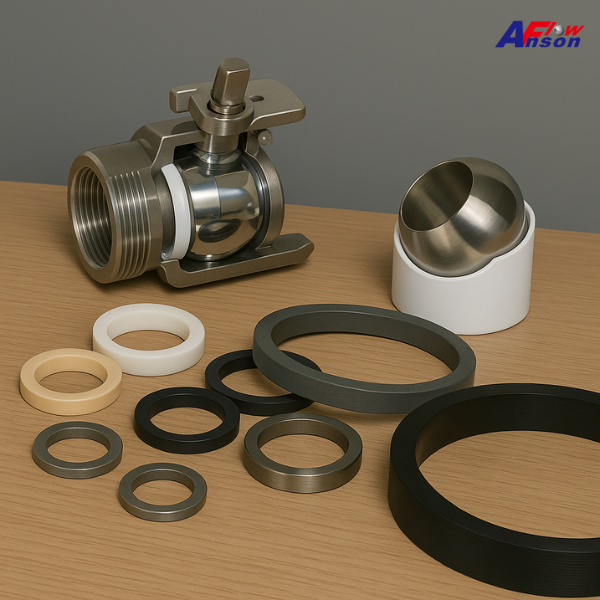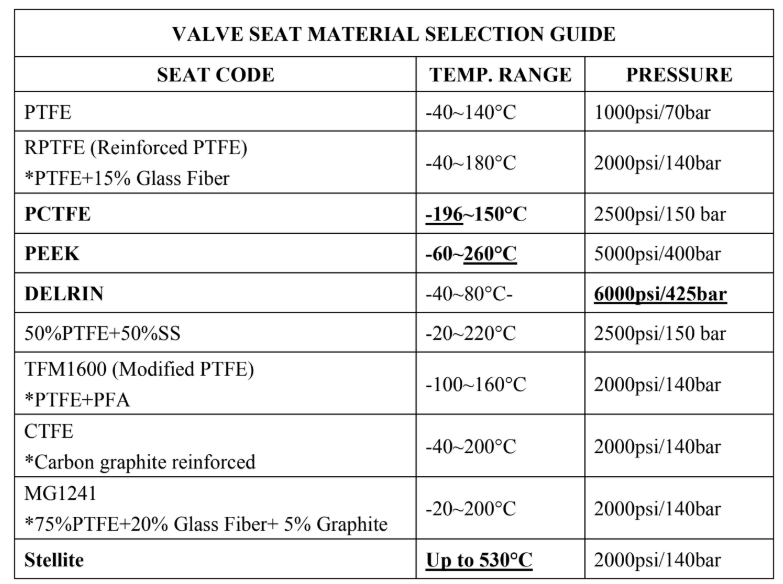
The valve seat is a critical sealing component that ensures tight shutoff and long-lasting performance. Depending on the media, pressure, temperature, and industry-specific needs, selecting the right seat material is essential to prevent failure and ensure operational safety.
PTFE (Polytetrafluoroethylene)
Offers excellent chemical resistance and low friction. Suitable for low to medium pressure applications and clean processes. Max temperature: ~140°C. Applications: Acid transfer, food and beverage, pharmaceuticals, water treatment.
RPTFE (Reinforced PTFE)
RPTFE blended with fillers such as glass fiber or carbon for enhanced strength, wear, and deformation resistance. Applications: Steam, high-cycle automated systems, chemical processes.
PCTFE (Polychlorotrifluoroethylene)
Lower cold flow and higher mechanical strength than PTFE. Maintains properties at cryogenic temperatures. Applications: Cryogenic valves, liquefied gases, oxygen service.
PEEK (Polyether Ether Ketone)
High-performance thermoplastic. Excellent resistance to high temperature (up to 260°C), pressure, and aggressive chemicals. Applications: Oil & gas, nuclear, aggressive solvents, high-pressure systems.
Delrin (Acetal)
Rigid and dimensionally stable. Low moisture absorption. Can be used in high-pressure environments up to approx. 6000 psi. Not ideal for strong acids or high temperatures. Applications: High-pressure water systems, general industrial valves, pneumatic and hydraulic systems.
50% PTFE + 50% SS (Stainless Steel powder)
A composite seat for added strength and thermal conductivity. Better wear resistance while retaining chemical compatibility. Applications: Abrasive media, steam, slurry service.
TFM1600
Modified PTFE with smoother finish and improved creep resistance. Lower gas permeability and excellent for cleanroom or high-purity processes. Applications: Semiconductor, biotech, ultra-pure water.
MG1241
A filled PTFE compound containing 20% glass fiber and 5% graphite, formulated for superior wear and chemical resistance. Provides low friction and higher dimensional stability. Applications: Automated process valves, fine chemicals, high-cycle operations.
Stellite (Cobalt-Chromium Alloy)
Extremely hard metal seat. Excellent for extreme temperature and erosive conditions. Typically used in metal-seated valves. Applications: Power generation, mining, slurry, high-erosion service.
Conclusion
Choosing the right valve seat is essential to ensuring long service life, safety, and system efficiency. Whether you're handling acids, slurries, cryogenics, or high-pressure steam, Anson Flow provides a complete range of seat materials to suit your toughest challenges.
